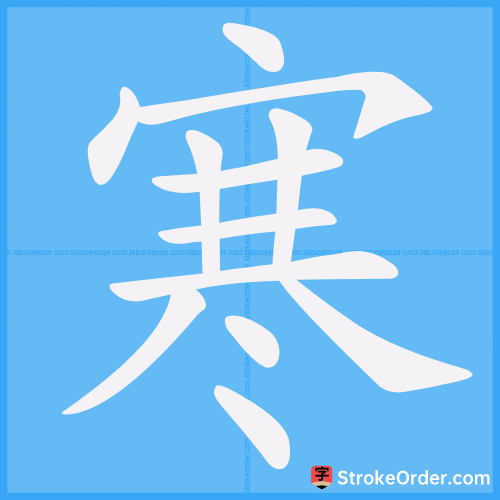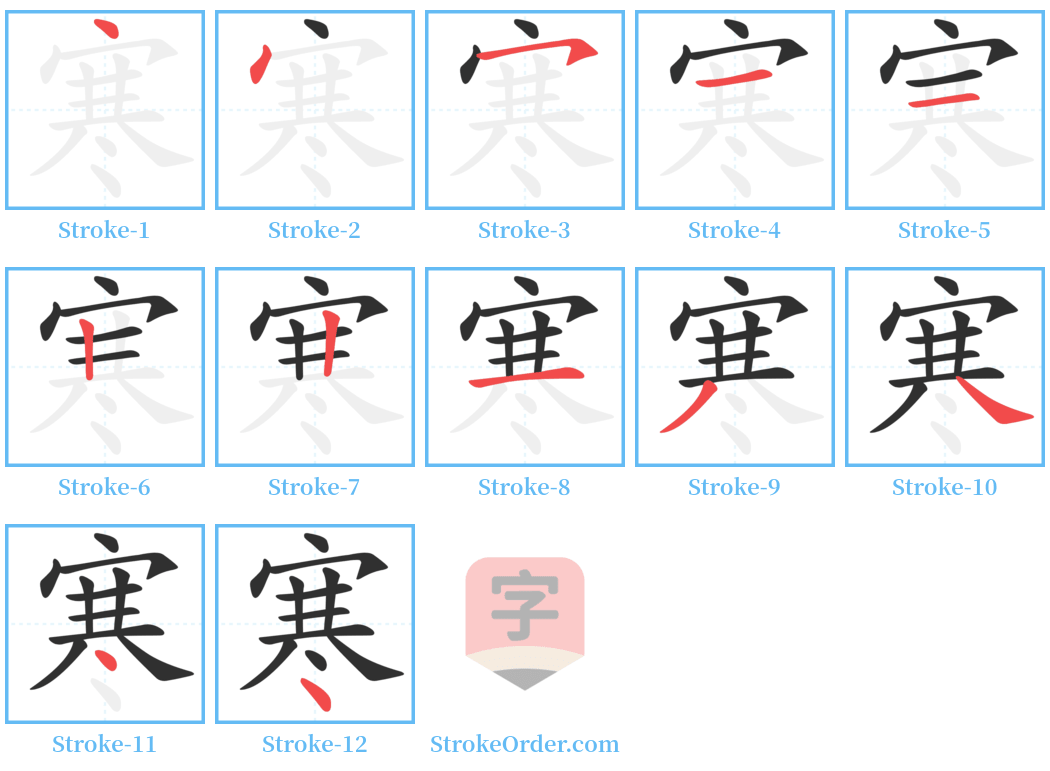寒 Stroke Order
Animated Stroke Order of 寒

Stroke Order Diagrams for 寒

Step-by-Step Handwriting Guide for 寒

Learn to Write Chinese Characters with Video Tutorials
Watch the video of writing the Chinese character "寒", learn the correct stroke order (笔顺) of the character "寒", and master the standard way of writing the character "寒".
Free Printable Handwriting Practice with Stroke Order: 寒
Printable Writing Practice Worksheet of "寒" in Portrait Orientation (Tian Zi Ge)

Printable Writing Practice Worksheet of "寒" in Landscape Orientation (Tian Zi Ge)

Information of 寒
Pinyin
hán
Radical
宀
Strokes
12 strokes
Usage
★★★★★
Definition
cold / poor / to tremble
寒 [hán]
1. Cold, opposite of "暑" (heat).
1.1. Cold winter.
1.2. Cold color.
1.3. Cold clothes.
1.4. Cold and chilly.
1.5. Cold belt.
1.6. Cold war.
1.7. Cold shiver.
1.8. Cold food (a festival name, referring to the day before the Qingming Festival, when the ancient people would refrain from cooking and some regions treat Qingming as "cold food").
1.9. Cold clamor.
1.10. Cold comes and heat goes; when the lips are gone, the teeth are cold.
2. Fear.
2.1. Cold heart.
3. Poverty, sometimes used as a humble term.
3.1. Cold door.
3.2. Cold servant.
3.3. Cold hut.
3.4. Cold window (metaphor for a harsh learning environment).
3.5. Cold bitterness.
3.6. Cold scholar (historically referred to poor students).
寒 [hán] (verb)
1. To feel cold.
1.1. Cold jade (a metaphor for a cool demeanor).
2. Fear; to tremble.
2.1. "If the king is ten parts Zheng, the Liang family will be filled with cold heart."
2.2. Cold heart, sore nose.
3. Specifically refers to ending an agreement.
3.1. "So the previous pact was ended."
寒 [hán] (noun)
1. The cold season. Opposite of "暑" (heat).
1.1. "The change of cold and heat."
1.2. To encounter cold and heat.
1.3. To suffer from cold and heat.
2. Cold day.
2.1. Cold sunlight.
2.2. Dead grass on a cold day.
2.3. Crossing point on a cold day.
2.4. River on a cold day.
3. Cold night.
3.1. Watch during a cold night.
3.2. Stars on a cold night.
3.3. The sound of the wooden clapper on a cold night.
4. Refers to symptoms of functional decline caused by cold.
4.1. Caught a bit of the cold.
5. Surname.
persevere ten years in one's studies in spite of hardships / ten year's study at a cold window -- a student's long years of hard study
There is a chill in the spring air. / There is a chill in the air in early spring. / The early spring weather is chilly. / slight spring chill
Input Method for 寒
Pinyin
han2
Wubi
pfju|pawu
Cangjie
jtcy
Zhengma
wdot
Four Corner
30303
Unicode
U+5bd2
Same Pronunciation Characters